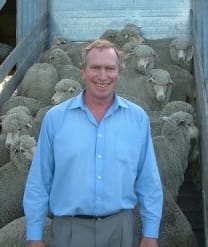
Sheep CRC chief executive officer James Rowe
PREDICTIVE sheep management application ASKBILL is being developed to potentially help producers meet lamb contract weight targets and processors to better understand on-farm production potential.
ASKBILL’s creator, the Sheep CRC, is also working on a component to help wool growers meet market staple length targets and requirements.
In the Sheep CRC’s latest newsletter, Sheep CRC chief executive officer Prof James Rowe said a new initiative was being planned with the Australian Meat Processor Corporation to use ASKBILL data to better manage lamb and sheep meat supply during variable seasonal conditions.
“Schedules for the project agreement have been finalised and we expect to start work by mid-December,” Prof. Rowe said.
The web-based ASKBILL app incorporates farm data and climate information via a number of biophysical models to help assess future risks and opportunities and inform decisions on livestock management. It is designed to draw on information generated by biophysical models that use daily downloads of climate data and forecasts to provide estimates for individual farms of the risk of flystrike and parasite infection, likely pasture production, livestock nutritional requirements and feed budgets, and risks associated with extreme weather events.
“What you’ve got with ASKBILL is climate data that drives soil moisture and pasture production, from which you get an estimate of liveweight gain.
“This is also informed to an extent by the genetics of the animals,” Prof. Rowe told Sheep Central.
“So if you combine that genetic information with your environmental and feed production, you can get predictive growth rates for, we estimate 90 days is going to be reasonably accurate, because your soil moisture acts as a real buffer.
“And because you are updating the system every day you keep ahead of the curve or as close to it as you can,” he said.
“And with that you can start then to see when your stock are going to reach target weights.”
Professor Rowe said the predictions would always need some verification with physical pasture measurements, which might mean re-setting of plant growth and Feed On Offer projections.
“Similarly if you weight your animals at keep points in the growth curve, you refine your estimates of turn-off date.
“It gives us an opportunity then to have a visibility in turns of what is going on on-farm for buyers and processor,” he said.
“Instead of just doing the rounds of all the sales and setting grids to try to get people to feed animals out of season, they can actually see what’s happening during the season in suppliers’ flocks.
“That’s the concept that we are working on.”
Professor Rowe said ASKBILL would help producers and processors monitor conditions “so they don’t run into surprises.”
“Everyone knows that there is variability in the season, but the more you can predict and the further out you can schedule things the better.”
Professor Rowe said the initial uses of ASKBILL are expected to be prediction of feed budgets, but he was confident about the prospects for the app’s sheep meat and wool applications.
“It’s an ambitious project, but I can see no reason why we won’t get increasingly accurate predictions.”
He said ASKBILL’s developers are drawing on data from the Information Nucleus program with data from eight sites around Australia, with the widest possible range of range of genetics, and following animals through growth curves and carcase characteristics for seven years.
“So we have a database there in terms of the predictions that we can set and check and validate that is just second to none.
“There is work to be done but there is one thing that you can be absolutely confident about, that any predictions we make will only get better with time as we collect more and more data.”
ASKBILL has been trialled with a pilot group of trial users and a validation project is continuing on 11 properties in Western Australia, South Australia and New South Wales with staff and consultants active in pasture sampling and livestock measurements. The CRC is also running a number of webinars with service providers to develop a greater understanding of the predictive models used in ASKBILL.
The Sheep CRC said changes to ASKBILL to address the comments received from trial users are currently being released to the development site for final checking prior to release to trial users.
These changes include:
- reducing the number of alerts and providing the option for users to set the frequency of alerts;
- setting of live weight and condition score targets separated out as a stand-alone function;
- changes to stock descriptions to improve ease of use;
- risk displays to show the previous 9 months (rather than previous 3 months) and the forecast 3 months as the default screen;
- changes to the what-if tools to make them easier to locate and use; and
- incorporation of a tool that adjusts the soil fertility slider on the basis of soil test results.
The Sheep CRC said clarity in the operational delivery of improved weather forecasts from the Bureau of Meteorology has allowed it to schedule the commercial release of ASKBILL for late April 2018.
More information is available at www.sheepcrc.org.au
Source: Sheep CRC.

HAVE YOUR SAY